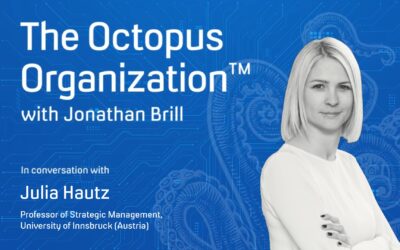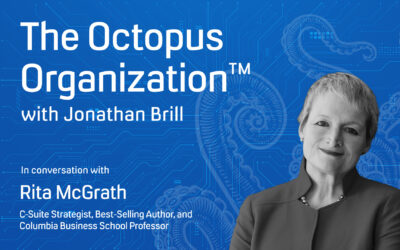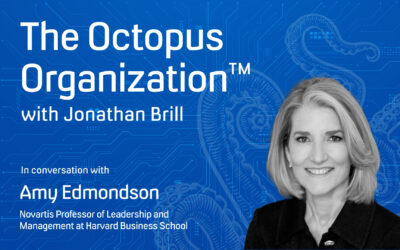Business futurist and AI keynote speaker Jonathan Brill speaks with Steve Denning, a renowned management innovator, author, and former World Bank executive. Denning shares his journey from being a lawyer to a transformative leader at the World Bank, emphasizing the power of storytelling in driving organizational change. He discusses the challenges of resistance to change, the importance of understanding different narratives, and how a simple story can inspire a massive shift in an organization’s culture and operations.
Here’s their conversation:
Episode Transcript
Introduction
Jonathan Brill: The future belongs to organizations that think like an octopus, distributed, intelligent, and endlessly adaptive. I’m business futurist and AI keynote speaker Jonathan Brill. In this series, I talk with global leaders about how technology is rewriting the rules of business. In today’s conversation, I speak with Steve Denning, the prolific author and former World Bank executive about the power of storytelling in driving organizational change.
Tell me a little bit about who you are?
Steve’s Background and World Bank Experience
Steve Denning: My name is Steve Denning. I was born in Sydney, Australia. I grew up there. I studied law, I worked as a lawyer in Sydney. I went to Oxford University and studied some more law, and then I joined the World Bank, this big international organization, brilliant people, tons of money, mission to die for relieving world poverty. And I was there for several decades and it was exciting, but it was very difficult to get things done despite these tremendous advantages. And I studied why that was so and how we could change it.
At one point when I’d actually climbed up the managerial ladder and was director of the Africa region, which is a third of the lending operations and this big international organization. So I thought this was a pretty important kind of position, but then the scene suddenly changed. The president of the World Bank suddenly died and my boss unexpectedly retired and somebody else was appointed to my position.
The Turning Point: Sent to “Siberia”
Steve Denning: So things were not going too well for me now in the World Bank. So I asked the top management, do you have anything in mind for me? Not really. They said, not really. So I was being sent to Siberia. They said, go and look into information. So that was Siberia.
So I looked into information and we were drowning in information. Couldn’t find anything. Obviously had to clean that up, but I had another thought. We clean it up. We’d still be the same kind of slow moving public sector lending organization, but supposing we did something else. Suppose we shared our knowledge, we had tremendous knowledge about what the World Bank knew about, but was very difficult to have access. So I said, why don’t we reverse that? Why don’t we make it very easy for anyone to get access to what we know? Then we could be a pretty interesting, even exciting organization.
The Knowledge Sharing Vision
Steve Denning: Let’s become a knowledge sharing organization. So I tried this idea out on the management and they said, get lost. We’re a lending organization. We’re a bank. We actually lend money. That’s what we do. Steve, go back. This is not what we do. So that didn’t work, and I tried everything, slides, explanations, reasons until one day I stumbled on a story, a story that could somehow communicate to the management why this was going to be so important, and that story resonated first with staff and then managers, and then the president of the bank went out about it and he said, right, let’s do it.
He went to the annual meeting of the World Bank October 1st, 1996 and announced to the finance ministers of the world, a huge public occasion. We are to do this. We are going to share our knowledge with the world. We are going to become a knowledge bank.
Everyone was astounded as to how this guy who was being fired had somehow managed to co-opt the whole organization to pursue radically different strategy. And so I had stumbled on the idea that story could actually change the world, and so I wrote a book about how that happened and so the next 10 years I left World Bank and wandered around the Fortune 500 teaching them how to use the power of story to communicate change and spark change. And so I certainly found story very useful that I found that it was not about my story, it was the story of the listener and using story to spark a new story in the mind of the listener, which was what my work had been about.
Transformational Change and Resistance
Jonathan Brill: It seems like a very specific person I should be speaking to, so I’m glad that you’ve appeared here today. We were talking earlier about this idea of the questions that matter and this natural trajectory that most acts of transformation go through. Are there a couple of places where you’ve found some questions that matter that help people reframe what’s going on at different points in that process?
Steve Denning: The key point to me was to realize that abstractions didn’t change minds, and so I had to tell a story which I stumbled on by accident, that started a new story in their mind and that started a whole evolution of people sharing that story, sharing it with other people, and so first staff and then junior managers and then middle managers and then senior managers and the president of the World Bank hearing about it and then telling the finance minister of the world, this is the future of the World Bank.
And so it was not as though there was any one moment. This was continuing to spark this movement and there was opposition at every one of these stages, people were trying to stop it. Centurion guards were horrified, and so it was using stories to outmaneuver these various peoples, but it was like a continuous interaction that many times it seemed as though we were about to fail.
But if you were confident and you could continue to draw on the inspiration and use stories to inspire people, then we got through all the difficulties that it was, you would have a crisis and you would retell some of the stories that sparked their enthusiasm and reminded them why we were on this journey and they kept at it. So after four years, we were being benchmarked as a world leader, knowledge management of a world bank, had never been benchmarked in any management issue before, but that was just beginning of a longer term journey.
The Continuing Journey
Steve Denning: Then I moved on from the World Bank to the Fortune 500 and started sharing the stories. And so the journey just kept on spiraling and spiraling. And so now I’m changing capitalism. I just published a book on inspiring the world to change capitalism. Here I am sort of just a single citizen sitting in Vienna trying to change the world, but I have the power of a story, which has already sparked a lot of people in this conference.
They’re thinking about, well, yes, why don’t we do this? Why don’t we, this is so relevant and they are inspired. It’s not like at any point we’re jumping off a cliff. It’s not like we come to a turning point. Everything is a continual movement and the side that forces trying to push us backwards and we’re using the power of story to inspire people to carry us forward.
The Balance of Stories and Abstractions
Jonathan Brill: I think that’s actually the key nugget that you bring to this is that the insight, the abstractions don’t work. It’s about stories. It’s about driving into other people’s stories.
Steve Denning: But abstractions are useful. I’m not saying abstractions aren’t useful. One of the things about my current book is to have a set of stories about why we’re doing this and to use those stories to spark change, but to have a very clear analytical framework where people can discern where they are now, where they need to be. And so they can start to think rationally, well, I’ve got a company of a hundred thousand people who are currently operating in this mode, and sorry, in their mind, that is their assumption. That’s how we do things around here.
And so the strategy, the budget, their HR, every process is geared around that set of stories. And what we’re seeing is that there are a set of other firms that are operating on a very different set of stories, and they happen to be making a lot more money. They are much more valuable in any company in history. They’re growing faster than in any company has ever grown in history.
And so the companies over here are starting to think, well, maybe we should look into this course finding that it’s not just new technology, it’s not just hiring a few new people. This a hundred thousand people have to start thinking, have a different mindset and a different passion, a different that this is going to be different. This is not something that will happen. Well, I think we should put a little bit more emphasis on that technology and move something over here. No, this is about passion. This is about drive. This is about making this happen across a hundred thousand people. That doesn’t happen easily. And so you have people like Satya Nadella who are moving people. They’re not just, oh, that’s very interesting. But no, this is about driving people forward.
Understanding “Resistance”
Jonathan Brill: That’s fantastic. In that moment of resistance. And it’s like you said, it happens at every stage of a transformation. The farther you get in, the greater the resistance often is from the smaller and smaller and smaller groups who benefit from the current incentive structure.
Steve Denning: I think it’s wrong to call it resistance. I think they are simply living a different story and understanding their story, empathizing with their story, understanding that that makes perfect sense to them. They are rational people. They are doing things rationally given their frame set. And before you start crafting a story, you need to understand what their story is. Then you can start to figure out what story might resonate with them and start to think how they could imagine things differently.
And there’s a certain amount of expertise that most stories do not spark change. You think about all the stories ever told millions of stories, trillions of stories, very few of those stories sparked major change. So there’s a certain pattern of narrative that is more adept to changing people’s minds. And so that’s one of the things that I stumbled on and wrote several books about that particular pattern of narrative.
The Zambia Story: A Case Study
Steve Denning: It’s very important to understand. So then you can find these stories that spark change no matter what the change. You don’t have to find it by accident as I did. The expertise involved is abstract expertise about storytelling. That certain stories, they have this certain pattern to give you examples, and it could be, say, the story that got me on this road that I stumbled on, this was in February, 1996.
And I said, well, let me tell you about something that happened just a few months ago. In June, 1995, a health worker in a little village in Zambia in Africa logged onto the website for the Center for Disease Control in Atlanta, Georgia, and got the answer to a question on how to treat malaria. And that was June, 1995, not June, 2025. This was not the capital of Zambia. This was a little village, 600 kilometers away. And this is not a rich country. This is Zambia, one of the poorest countries in the world.
But you know, the most important part of this picture for us in the World Bank, the World Bank is not in this picture. The World Bank does not have its knowledge organized to share with all the millions of people who make decisions about poverty. But just imagine if it was just imagine if we could organize, think what an organization could become. And yeah, it resonated, but people started at the base of the organization, middle of the top of the organization. We could do this. We have knowledge. Internet is there. We could make it happen. We could become a knowledge sharing organization so they would rush out of the room. I’ve just fantastic idea.
Now I can sit back because it’s no longer my idea.
Jonathan Brill: It’s not your idea.
Steve Denning: Not mine, they have the story. The story is driving them forward and as I said, reached the president of the World Bank. Eventually, despite the efforts of the centurion guards to block it, prevent it, he heard about it, right? And he’s then telling it to the finance ministers of the world. So this is how this tiny little 29 word story changed this massive organization, this unchangeable, change resistant organization and set them on a radically different path.
And of course, it took four years of struggles and battles with the centurion guards, all the people who didn’t believe and wanted to keep things the way they were, but they lost. The battle was won, and the war was won, and it became a knowledge sharing organization.
Closing
Jonathan Brill: That’s fantastic. Thank you. I really appreciate it, Steve.
Thank you for listening to the Octopus Organization. I’m Jonathan Brill. Subscribe now. And remember, in the age of AI, the line between survival and extinction is drawn by how boldly you adapt.
The Octopus Organization™ with Jonathan Brill is a series of conversations with global leaders, executives, and innovators about how AI and new models of leadership are rewriting the rules of business. Click here to see more episodes.



